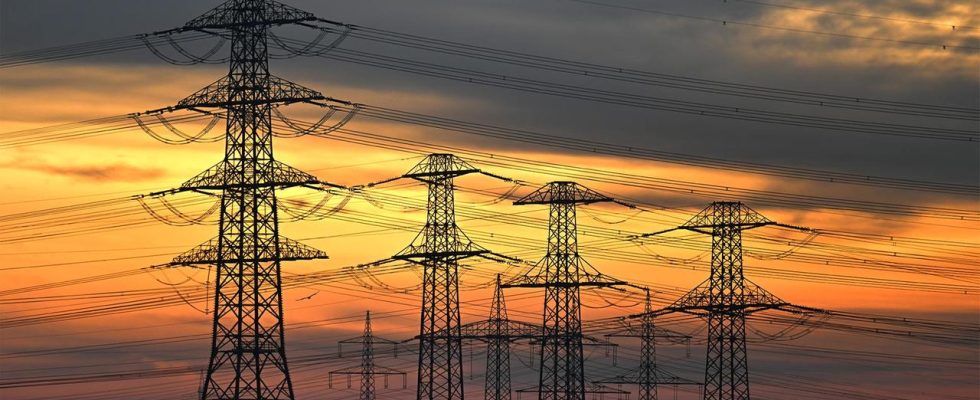background
Electricity prices have fallen again since the energy crisis. But the market remains in flux: some suppliers plan to raise tariffs. What can consumers expect?
Anyone who receives mail from the provider these days is well advised to look at the small print. Electricity and gas providers are obliged to announce price changes for basic services six weeks in advance – and a number of letters are likely to end up in customers’ mailboxes.
There is EnBW, for example. The energy company based in Karlsruhe says it has around 5.5 million customers in Germany. Many will probably have to dig deeper into their pockets from April. The group has announced that it will increase the prices for basic and replacement electricity by almost 16 percent.
Utilities pass on network fees
A household that uses 2,900 kilowatt hours per year can expect additional costs of around 16 euros per month. EnBW announced that one of the reasons was the increase in network fees for household electricity. “At the same time, state levies, levies and taxes have also increased overall, which are also part of the electricity price for households,” says EnBW.
At the end of the year, during budget discussions, the federal government decided to cancel the federal subsidy for network fees. It involved costs of 5.5 billion euros.
Verivox: Check tariff change
The four major long-distance line operators in Germany – Tennet, Amprion, 50Hertz and TransnetW – then more than doubled their network fees: from 3.1 to 6.4 cents per kilowatt hour. Thorsten Storck from the comparison portal Verivox agrees tagesschau.de: “A number of electricity suppliers pass these increases on to their customers in the form of higher prices.”
But there are also electricity providers, says Storck, who do not raise their prices thanks to lower procurement costs. “We therefore advise everyone who is affected by price increases or is still stuck with expensive tariffs from the time of the energy price crisis in 2022 to compare the available offers and, if necessary, change,” said the energy expert.
Electricity prices are likely to rise
Even if providers are even reducing electricity prices in some cases, it is becoming apparent that the price per kilowatt hour is likely to rise in the coming months. Other providers could decide to increase prices. In a survey of 26 suppliers by the dpa news agency, the majority of providers said they were still checking how the increased network fees would affect tariffs.
Some companies – as the EnBW case also shows – have already reacted. Looking ahead to the upcoming months of March and April, Verivox is counting more than five times as many price increases as price decreases. According to the information, providers increase their prices by an average of eight percent. However, this trend is not yet visible in the electricity price for new customers. The kilowatt-hour price has fallen continuously in recent months. According to Verivox calculations, it is currently around 26 cents.
Where do the differences come from?
Kerstin Andreae, Chairwoman of the Executive Board of the Federal Association of Energy and Water Industries (BDEW), points out tagesschau.de on the different strategies of the providers. “Most companies procure gas and electricity over the long term in partial quantities at different times,” says Andreae.
The supplier’s strategy smooths out the ups and downs on the energy exchanges and protects customers from sharp price jumps. But one thing is clear: “For all energy providers, some cost components in the electricity price will increase significantly due to the federal government’s decisions, and they will have to include them in the calculation of electricity prices.”
Prices on the electricity exchanges have recently been falling
There is currently no trend towards higher prices on the electricity exchanges themselves – quite the opposite: prices on the wholesale market have overall fallen over the past year. According to data from the Federal Network Agency, a megawatt hour on the European electricity exchange EPEX still cost a good 117 euros in January 2023. In January 2024, the average price was 77 euros per megawatt hour.
Even if wholesale prices continue to fall, that doesn’t mean that customers will notice immediately. “Long-term procurement also means that any falling stock market prices cannot be passed on to the end customer immediately, but it does provide more security,” explains BDEW boss Andreae.
Utilities with big profits
In addition to the political framework and developments on the electricity exchanges, the strategies of the energy suppliers themselves also play a major role in pricing. Given the sharp rise in energy costs, many competitors were able to make huge profits.
There is E.ON, for example, based in Essen. The DAX group was able to significantly exceed its own profit forecast last year. The situation is similar with RWE’s competition. According to preliminary figures, the group reports a net profit of 4.5 billion euros for 2023.

